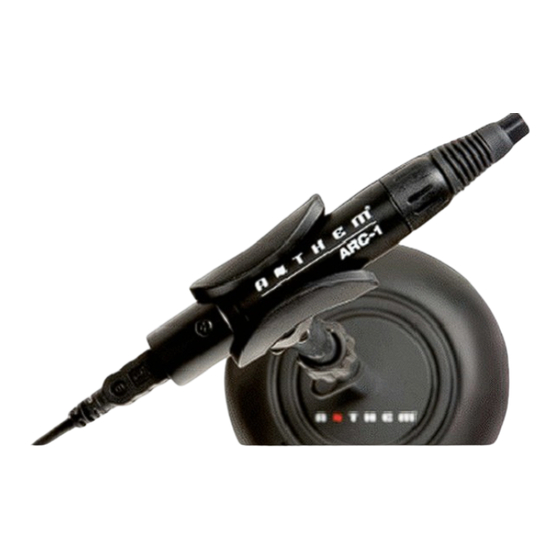
Advertisement
Quick Links
While equalizing frequency response in a room to achieve some
generic (i.e. "flat") response is a common approach to solving the
problem, it will result in an unnatural spectral balance, since it
doesn't take into account human hearing. Anthem's approach is a
true audiophile solution: the ultra-high-resolution Anthem Room
Correction (ARC
™
) system actually adjusts for the room's effects
on each speaker in a way that mimics our hearing to achieve
the optimal in-room sound. ARC
™
differs from other systems
in that it uses proprietary processing to compute each speaker's
in-room frequency response and then computes a target frequency
response for each to yield the optimal in-room sound.
What makes the ARC
™
system better ...
ARC
™
is unlike anything ever available. ARC
™
the-art room correction system that analyzes each speaker in
the room independently, then sets output levels, crossover
frequencies and room correction parameters for each speaker. The
system includes Anthem
®
software with files for the individually
calibrated microphone and specific Anthem
®
A/V processor.
ARC
™
applies Correction for up to 7 Channels plus
Subwoofer, operating on all analog and digital sources at 44.1
kHz, 48 kHz, 88.2 kHz and 96 kHz without reducing the bit rate.
ARC
™
applies Super-Efficient Infinite Impulse Response (IIR)
Filters in addition to Anthem's Custom Filter Topology to
minimize delay and reduce processing gain noise. The
combination of limiting the widths of our IIR filters and applying our
topology means that any artifacts that might have resulted from the
filtering process are so small as to be inaudible.
ARC
™
allows for Multiple Microphone Measurements.
Most "Room EQ" methods work from a single point source,
taking one measurement at the primary listening position. ARC
provides for multiple user-selected measurement points (we
suggest a minimum of five), beginning with a measurement at the
primary listening position and then moving across the listening
area. This process is critical in properly dealing with standing
waves and ensures optimal sound throughout the listening area.
For more information on award-winning Anthem
®
technology, visit our website at www.anthemAV.com
– Brian Florian, Secrets of Home Theater and High Fidelity
Multiple Measurements and Ultra-High Resolution require
Enormous Processing Power. The AVM processor's Digital
Signal Processing design uses twin DSP engines (each rated at
150 million instructions per second!)—enough power to handle
the ARC
™
system's rigorous processing demands.
Unlike many "Room
EQ"
systems, ARC
to Peaks (modes) and Dips (anti-modes). Tackling both allows
us to achieve a far more accurate and natural room response.
And to limit the demands on the amplifier, as well as maximize
noise, ARC
™
applies appropriate limits to this correction.
ARC
™
is Ultra-Accurate! The connected PC's 64-bit floating-
point processor does the hard work of calculating the correction
is a state-of-
curves, which greatly minimizes rounding errors of a less
sophisticated "calculator".
ARC
™
provides the ability to set Separate Music and Movie
Configurations. This allows for choosing different speaker
configurations, setting different crossover points, and allowing
separate measurements and correction curves to optimize both
music and movie listening experiences.
ARC
™
allows a Simple, Fully-Automated Procedure as well
as a Manual Mode with Advanced User functions, allowing the
user to manually set:
– Crossover frequencies;
– Level of room gain;
– Maximum "Room EQ" frequency.
ARC
™
and the "Surround
Experience."
speakers are often at a great disadvantage in the quest for good
sound due to the variety of less-than-ideal placement options
typically available. Not any more! ARC ensures surround/rear
™
speakers match perfectly with the main speakers for a seamless
surround experience.
COMING SOON! ARC-1 Anthem
as an add-on for existing AVM 40's and AVM 50's. Contact
your Anthem
®
Dealer for more details.
™
applies Correction
Surround and rear
®
Room Correction System
Advertisement

Summary of Contents for Anthem ARC
- Page 1 Signal Processing design uses twin DSP engines (each rated at doesn’t take into account human hearing. Anthem’s approach is a 150 million instructions per second!)—enough power to handle true audiophile solution: the ultra-high-resolution Anthem Room the ARC ™...
- Page 2 Left Front Speaker – ARC ™ measures, calculates and corrects for sound anomalies caused by room boundaries and reflective surfaces. The process starts when a test signal is sent from the Anthem ® processor to each connected speaker and the signal is picked up by the individually calibrated microphone.
















Need help?
Do you have a question about the ARC and is the answer not in the manual?
Questions and answers